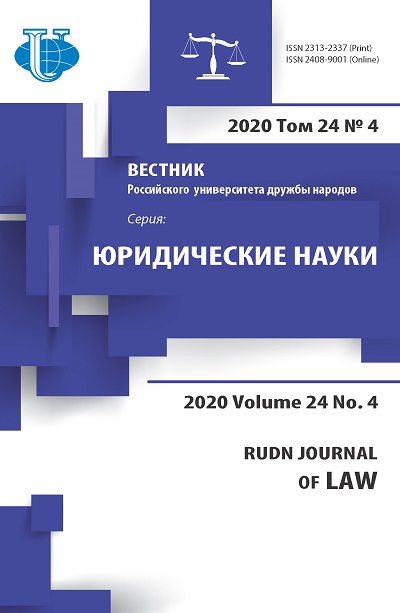LEGAL REGULATION OF COMMUNICATION PRIVACY IN THE INFORMATION SOCIETY
- Authors: Izotova A.N.1
-
Affiliations:
- National Research University Higher School of Economics
- Issue: Vol 24, No 4 (2020)
- Pages: 985-1004
- Section: CIVIL LAW
- URL: https://journals.rudn.ru/law/article/view/25249
- DOI: https://doi.org/10.22363/2313-2337-2020-24-4-985-1004
- ID: 25249
Cite item
Full Text
Abstract
The article is devoted to the regulation of communication privacy, which is not only a guarantee of the individual right to confidentiality and privacy, but also a necessary condition for the collective freedom of speech, trust in communication services, which is essential for formation of the information society. The right to communication privacy with the advent of new communication technologies is being transformed and expanded, which requires updating and harmonization of the legal framework. In this regard, the purpose of the research is to reveal problems and contradictions in updating legal regulation of communication privacy, including by analyzing legislation and existent scientific approaches to the content of communication privacy, description of mechanisms for both ensuring and limiting communication privacy, as well as interaction of legal entities regarding communication privacy. The relationship between Russian and European legislation, which regulate communication privacy (ePrivacy) have been considered in this paper. The research methodology is represented by such methods as dialectical, analysis, analogies, formal-legal, comparative methods of research activity. The work demonstrates different approaches to determining the content of the right to communication privacy, expanding the range of professional subjects of communication privacy, and “loosening” the mechanisms for limiting this right in the direction of its expansion in the context of interrelations between subjects of legal relations concerning communication privacy.
About the authors
Anzhelika N. Izotova
National Research University Higher School of Economics
Author for correspondence.
Email: anzheliki@rambler.ru
senior legal adviser of Mobile TeleSystems Public Joint Stock Company, postgraduate student, the Department of Information Law
20 Myasnitskaya Ulitsa, Moscow, 101000, Russian FederationReferences
- Barak, A. (2012) Proportionality. Constitutional Rights and their Limitations. Proportionality. Constitutional Rights and their Limitations. Cambridge University Press, available at: https://doi.org/10.1093/icon/mov028
- Bendor, A. L. Sela, T., (2015) How proportional is proportionality? International Journal of Constitutional Law. 13(2), 530–544, available at: https://doi.org/10.1093/icon/mov028
- Bogdanovskii, A. (2006) Mozhet li oshibat'sya Konstitutsionnyi sud? [Can the Constitutional Court be wrong?]. Zakonnost'. No. 8. 32–36. (in Russian).
- Bondar', N.S. (2005) Vlast' i svoboda na vesakh konstitutsionnogo pravosudiya: zashchita prav cheloveka Konstitutsionnym Sudom Rossiiskoi Federatsii [Power and freedom on the scales of constitutional justice: protection of human rights by the Constitutional Court of the Russian Federation]. Moscow, Justicinform Publ. (in Russian).
- Brunner, L. (2018) Digital communications and the evolving right to privacy. In M. Land, J. Aronson (eds.), New Technologies for Human Rights Law and Practice (217–242). Cambridge, Cambridge University Press. doi: 10.1017/9781316838952.010
- Chechetin, A. (2005) Ogranichenie tainy svyazi [Limiting the secrecy of communication]. Zakonnost'. (7), 38–40. (in Russian).
- Dedov, D., Jakushev, M., Belov, S., Golovko, L., Bogush, G., Balytnikov, V., Soboleva, A., Sekretareva, N., Koroteev, K. (2018) Blokirovka Telegram v Rossii: kak obespechit' tainu perepiski? [Blocking Telegram in Russia: how to ensure privacy of correspondence?]. Zakon. (4), 18–28. (in Russian).
- Drewry, L. (2016) Crime without culprits: why the European Union needs data protection, and how it can be balanced with the right to privacy. Wisconsin International Law Journal. Spring. 37 (1), available at: https://wilj.law.wisc.edu/issues/ (Accessed 02 March 2020).
- Gushev, M.E., Shuvalova, A.M. (2015) The restriction of constitutional rights of missing citizens. Historical and Social–educational idea. 7(4), 64–66. doi: 10.17748/20759908.2015.7.4.064-066. (in Russian).
- Hoboken, J., Zuiderveen Borgesius, F. (2015) Scoping electronic communication privacy rules: data, services and values. Journal of Intellectual Property, Information Technology and E-Commerce Law. 6 (198), para 1, available at: https://papers.ssrn.com/sol3/papers.cfm? abstract_id=2777156 (Accessed 07 June 2020).
- Kufleva, V.N., Kubrak, V.S. (2018) Problems of realization of the right for the mystery of correspondence in messengers: theoretical and komparativistsky aspects. Humanities, socialeconomic and social sciences. (10), 153–157. (in Russian).
- Nevzgodina, E.L. (2012) Yuridicheskaya sushchnost' predstavitel'stva kak universal'noi i unikal'noi formy posrednichestva [The legal essence of representation as a universal and unique form of mediation]. Herald of Omsk University. Series «Law». 2 (31), 121–129. (in Russian).
- Papakonstantionou, V., Hert, P. (2011) The amended EU Law on ePrivacy and electronic communications after its 2011 implementation; new rules on Data protection, Spam, Data breaches and protection of intellectual property. The John Marshall Journal of Computer & Information Law, available at: https://repository.jmls.edu/jitpl/vol29/iss1/2/ (Accessed 10 June 2020).
- Post, R.C. (2017) Data privacy and dignitary privacy: Google Spain, the right to be forgotten, and the construction of the public sphere. (April 15, 2017). Duke Law Journal. Forthcoming, Yale Law School, Public Law Research Paper. (598), available at: http://dx.doi.org/ 10.2139/ssrn.2953468. (Accessed 02 June 2020).
- Rego, A.V., Matskevich, A.Yu. (2019) The problem of access of antitrust authorities to secrecy of communication. Russian competition law and economy. (3), 16–19. (in Russian).
- Soldatova, V.I. (2020) Protection of personal data in digital environment. Lex Russica. (2), 33–43. (in Russian).
- Tenishev, A.P. (2018) On antitrust cybercrimes, access to secret information and the digital special unit. Competition and Law Journal. (5), 14–20. (in Russian).
- Tereshhenko, L.K. (2016) Otdel'nye voprosy, voznikayushchie v sudebnoi praktike pri primenenii norm o taine svyazi [Certain issues arising in judicial practice when applying the rules on the secrecy of communication]. Kommentarii sudebnoi praktiki [Certain issues that arise in judicial practice when applying the rules on communication privacy. Commentary on judicial practice] Is. 21. In: Jaroshenko, K.B, Moscow, Institute of Legislation and Comparative Law under the Government of the Russian Federation: INFRA-M Publ. 145–153. (in Russian).
- Zuiderveen Borgesius, F., Steenbruggen, W. (2018) The right to communications confidentiality in Europe: protecting trust, privacy, and freedom of expression. Theoretical Inquiries in Law, Forthcoming, available at: https://ssrn.com/abstract=3152014 (Accessed 17 May 2020).
- Vaipan, V.A., Egorova, M.A. (eds.) (2019) Pravovoe regulirovanie jekonomicheskih otnoshenij v sovremennyh uslovijah razvitija cifrovoj jekonomiki [Legal regulation of economic relations in modern conditions of digital economy development]. In: Vaipan V.A., Egorova M.A. Moscow, Justicinform Publ. (in Russian).
Supplementary files















